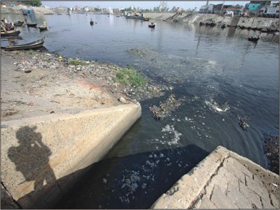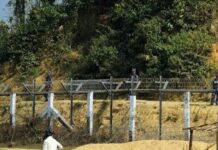The Old Brahmaputra, once a mighty river running through Narsingdi district, is now dying because of unabated discharge of factory wastes and chemicals apart from encroachment.
Some 100 dyeing factories and textile industries set up over 5-6 kilometers of the riverbank at Narsingdi sadar upazila and Polash upazila are spilling untreated toxic and chemical contaminated water into the river destroying its ecosystem.
During a visit to bank of the Brahmaputra River on Thursday, the UNB correspondent found that a number of the dyeing, printing and textiles industries and other factories have been built by grabbing the river, and the factories are discharging highly toxic water into it.
Although it is mandatory to set up an Effluent Treatment Plant (ETP) in every factory before going to its operation as per the rules of the Department of Environment (DoE), most of the factories are not following the DoE rules.
Recalling its lost beauty and old fury, a sexagenarian said the river once was so vibrant with hundreds of boats sailing around and the local people, including fishermen, and farmers, depending on it for their own various purposes.
Now locals fear that the continuation of discharge of untreated effluents into the river water would not only kill the fishes but also dent the future of the framers in the region. “The dyeing factories are not only killing the river but also destroying our future,” said Idris Ali, an inhabitant of Gonergaon village of Shilmandi Union under Narsingdi sadar upazila.
Idris said the local people used to catch fishes from the river in plenty only a few years ago to meet their household demand, but now no organism can survive in its badly polluted water.
Farmers alleged that their agriculture is being affected since the dyeing factories and industries are continuously spewing toxic industrial wastes into agricultural lands and water bodies.
They said the toxic water goes down the drains from those factories and finally end up in Old Brahmaputra and other water bodies. Before going into the rivers, canals, and water bodies, the toxic water spreads into vast tracts of arable land, thus seriously damaging land fertility.
The toxic wastes include chemical dyes, detergents, ammonia, lime, sulfate, sulfuric acid, soda, bleaching powder and many other toxic materials.
Mohammad Alamgir Hossain, a farmer whose home is located at Shilmandi village in the vicinity of the river, said farmers can no longer produce crops on their arable lands as toxic water damaged their fields. “No crop is grown in polluted water,” he added.
About the biodiversity of the area, Alamgir said there were various species of fish, turtles, birds and snakes in the river and its bank, but all they have gone extinct.
Locals said the water of the river has turned poisonous and black due to continuous dumping of chemical mixed water by factories and if someone uses s/he will be infected with skin diseases.
Abdul Baker, chairman of the Shilmandi Union Parishad, said the deputy commissioner of Narsingdi had taken an initiative and urged the factory owners to set up ETPs in their factories. “But his initiative fell flat as most of the factory owners did not pay heed to it.”
Blaming the DoE, he said the DoE officials do not take any effective step to force the owners to set up ETPs and make them operational as it has complicity with the factory owners, an allegation turned down by the DoE.
DoE senior chemist in Narsingdi Mohammad Ataur Rahman said the DoE is monitoring the activities of the factories that are polluting rivers, water bodies and environment.
“Last year, we fined factories about Tk 5 crore for discharging untreated water. We also fined the factories which have not installed ETPs yet. We realised Tk 1 crore in fine last month alone,” he said.
Ataur said although the factories need to keep the installed ETPs operational 24 hours a day, they shut down their ETPs at night and thus pollute the environment and rivers.
He said the DoE has no capacity and manpower to carry out drives at night and suggested introducing ‘environment police’ so that they can conduct drives against the nighttime polluters.
Source: UNBConnect










